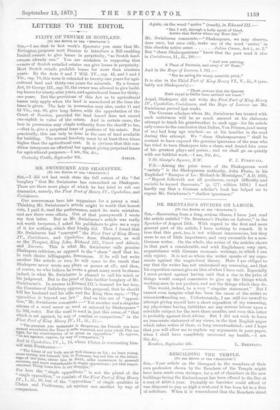LETTERS TO THE EDITOR.
FIXITY OF TENURE IN SCOTLAND.
ere THE EDITOR Or THE " SPECTATOR."] see that in last week's Spectator you state that Mr. Errington proposes next Session to introduce a Bill enabling limited owners to give leases in perpetuity, "as Scotch land- owners already can." You are mistaken in supposing that owners of Scotch entailed estates can give leases in perpetuity. Most Scotch entails prohibit leases for more than nineteen years. By the Acts 6 and 7 Will. IV., cap. 42, and 1 and 2 Vic., cap. 70, this term is extended to twenty-one years for agri- cultural land and thirty-one years for minerals. By a former Act, 10 George III., cap. 51, the owner was allowed to give build- ing leases for ninety-nine years, and agricultural leases for thirty. one years. But the provisions of this Act as to agricultural leases only apply when the land is unenclosed at the time the lease is given. The heir in possession may also, under 11 and 12 Vie., cap. 36, give long leases, with the approbation of the Court of Session, provided the land leased does not exceed .one-eighth in value of the estate. And in certain cases, the heir in possession may obtain authority from the sheriff to feu, —that is, give a perpetual lease of portions of his estate. But practically, this can only be done in the case of land available for building. The annual feu-duty must be at least three times higher than the agricultural rent. It is obvious that this con- dition interposes an effectual bar against giving perpetual leases for agricultural purposes.—I am, Sir, &c., Cortaclly Castle, September 9th. AIRLIE.


































 Previous page
Previous page